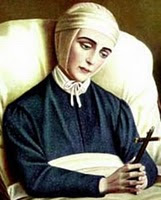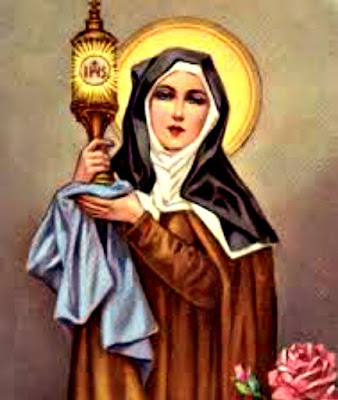Blessed Anne Catherine Emmerich
Today the Church commemorates Blessed Anne Catherine Emmerich (1774 - 1824), an Augustinian nun, stigmatic, mystic, visionary and ecstatic.
Anne was born in the small farming community of Flamsche, near Coesfeld, in the Diocese of Münster, Westphalia, Germany. Her family was poor, but pious and virtuous. As a child, she suffered with poor health and received visions and prophesies so often that she thought all children had them. She was a gifted healer and was able to diagnose illness and to prescribe cures.
At age 28, she entered the Augustinian convent. Here, her great enthusiasm for the faith, as well as her strange and unusual ways, disturbed and puzzled the other sisters.
When the convent was closed by government order in 1812, Anne found refuge in a poor widow's home. She became very ill and in 1813, at the age of 38, was bedridden. From that time on, her visions increased and she she began manifesting the wounds of Christ: first, a circle of bleeding wounds around her head, followed by wounds on her hands and feet and the imprint of a cross on her chest. During this time of illness, she showed her great love for others by sewing clothes for poor children and graciously accepting visitors, listening to their concerns, praying for them, and comforting them with words of encouragement and inspiration. During the last twelve years of Anne's life her sole sustenance was the Holy Eucharist.
In 1833, The German Romantic poet, Clemens Brentano, offered to write down her visions and the result was The Dolorous Passion of Our Lord Jesus Christ. This was followed by The Life of the Blessed Virgin Mary in 1852, and The Life of Our Lord from 1858 to 1880.
During the summer of 1823, Anne grew weaker, yet continued to unite her sufferings with the sufferings of Jesus, offering it up for the salvation of all souls. She died on February 9, 1824 and was beatified by Pope John Paul II on October 3, 2004.
~ © February 9, 2010, Jean M. Heimann, Updated and Revised, February 9, 2011.
Quotes:
"Man's value before God is estimated by the dispositions of his heart, its uprightness, its good-will, its charity, and not by keenness of intellect or extent of knowledge."
"The prayer most pleasing to God is that made for others and particularly for the poor souls. Pray for them, if you want your prayers to bring high interest."
"O who can tell the beauty, the purity, the innocence of Mary! She knows everything, and yet she seems to know nothing, so childlike is she. She lowers her eyes and, when she looks up, her glance penetrates like a ray, like a pure beam of light, like truth itself! It is because she is perfectly innocent, full of God, and without returns upon self. None can resist her grace."





Comments
Post a Comment
Comments are moderated and are published at the blogger's discretion.